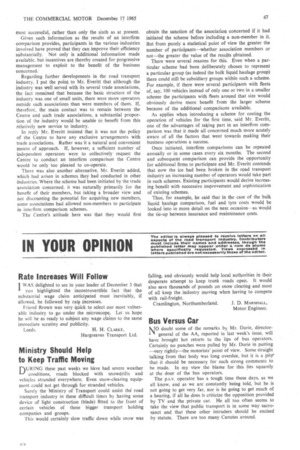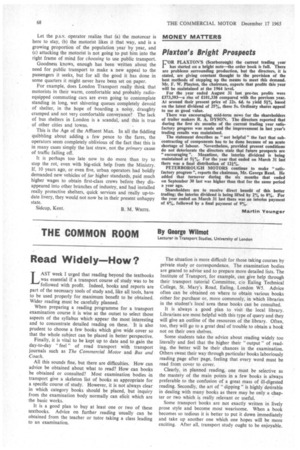IN YOUR OPINION
Page 69

Page 70

If you've noticed an error in this article please click here to report it so we can fix it.
Rate Increases Will Follow
I WAS delighted to see in your leader of December 3 that you highlighted the incontrovertible fact that the substantial wage claim anticipated must inevitably, if allowed, be followed by rata increases. Friend Brown was very quick to select our most vulnerable industry to go under the microscope. Let us hope he will he as ready to subject any wage claims to the same immediate scrutiny and publicity. Leeds. H. H. CLARKE, Hargreaves Transport Ltd.
Ministry Should Help to Keep Traffic Moving
nURING these past weeks we hhve had severe weather conditions, roads blocked with snowdrifts and vehicles stranded everywhere. Even snow-clearing equipment could not get through for stranded vehicles. Surely the Ministry of Transport could assist the road transport industry in these difficult times by having some device of light construction (blade) fitted to the front of certain vehicles of these bigger transport holding companies and groups. This would certainly slow traffic down while snow was falling, and obviously would help local authorities in their desperate attempt to keep trunk roads open. It would also save thousands of pounds on snow clearing and most of all keep the industry moving when having to compete with rail-freight. Crarnlington, Northumberland.
Bus Versus Car
MO doubt some of the remarks by Mr. Durk, director" general of the AA, reported in last week's issue, will have brought hot retorts to the lips of bus operators. Certainly no punches were pulled by Mr. Dune in putting —very rightly—the motorists' point of view. Some straight talking from that body was long overdue, but it is a pity' that it should be necessary for such strong comments to be made. In my view the blame for this lies squarely at the door of the bus operators. The p.s.v. operator has a tough time these days, as we all know, and as we are constantly being told, but he is not going to get very far, nor is he going to get much of a hearing, if all he does is criticize the opposition provided by TV and the private car. He all too often seems to take the view that public transport is in some way sacrosanct and that these other intruders should be excised by statute. There are too many Canutes around. Let the p.s.v. operator realize that (a) the motorcar is here to stay, (b) the motorist likes it that way, and is a growing proportion of the population year by year, and (c) attacking the motorist is not going to put him into the right frame of mind for choosing to use public transport.
Goodness knows, enough has been written about the need for public transport to make a new appeal to the passengers it seeks, but for all the good it has done in some quarters it might never have been set on paper.
For example, does London Transport really think that motorists in their warm, comfortable and probably radioequipped commuting cars are even going to contemplate standing in long, wet shivering queues completely devoid of shelter, in the hope of •boarding a noisy, draughty cramped and not very comfortable conveyance? The lack of bus shelters in London is a scandal, and this is true of other cities and towns.
This is the Age of the Affluent Man. In all the fiddling quibbling about adding a few pence to the fares, the operators seem completely oblivious of the fact that this is in many cases simply the last straw, not the primary cause of traffic falling off.
It is perhaps too late now to do more than try to stop the rot, even with big-stick help from the Ministry. If, 10 years ago, or even five, urban operators had boldly demanded new vehicles of far higher standards, paid much higher wages to obtain first-class crews before they disappeared into other branches of industry, and had installed really protective shelters, quick services and really up-todate livery, they would not now be in their present unhappy state.
Sidcup, Kent. B. M. WHITE.












































































































